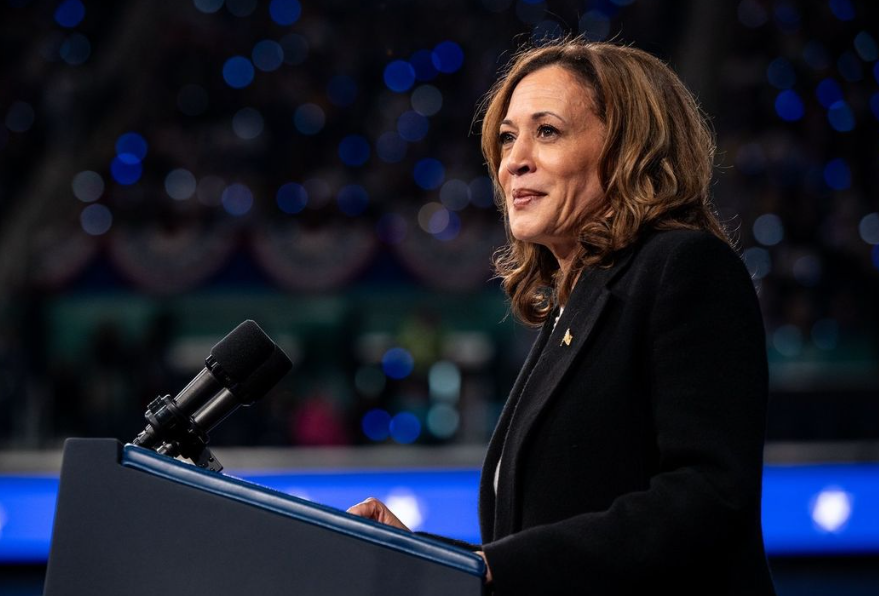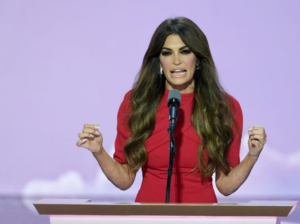Kamala Harris has maintained a consistent message throughout the presidential race, but in the final days, she has notably omitted two key words from her speeches: Donald Trump.
In her addresses on Monday night in Philadelphia and Pittsburgh, the vice president once again refrained from mentioning the former president. Instead, she focused on offering voters a fresh start, free from the divisiveness of the Trump era.
“We have a chance in this election to finally close the chapter on a decade of politics rooted in fear and division,” Harris declared during her campaign’s closing remarks. “We are finished with that. We’re done. We’re exhausted by it.”
The vice president seemed to have grown weary of talking about Donald Trump, marking a noticeable shift in her rhetoric. In earlier versions of her stump speech, Harris frequently mentioned Trump so often that his campaign even put together a compilation video of her references, which they played at his rallies.
In the final speeches of her brief but eventful 107-day campaign, Harris again focused on offering voters a vision of a kinder, more compassionate America. She contrasted her approach with Trump’s, claiming his “enemies list” would be replaced by her “to-do list.” Standing on the steps of the Philadelphia Museum of Art, made famous by the movie Rocky, she outlined key policy proposals, including a bold plan to expand home healthcare for seniors. She also provided a polished summary of her biography, but the tone of her speech was mostly about setting a new, more positive atmosphere.
She emphasized the negative aspects of the current political climate, vowing to remove those bad “vibes” and replace them with a more hopeful future.
“America is ready for a fresh start,” Kamala Harris declared. “Ready for a new way forward, where we see our fellow Americans not as enemies, but as neighbors.”
Throughout her campaign, Harris has repeatedly promised a “new generation of leadership,” a theme that started as a subtle undercurrent but became more explicit as Election Day approached. Supporters who gathered earlier at the Carrie Blast Furnaces, a former US Steel site, seemed eager to embrace her vision. This call for change was a central message in her convention speech this summer in Chicago and in her closing remarks at the Ellipse in Washington, DC, last week, where she delivered several final pitches, mostly in battleground states, as the campaign neared its end.
“It can be easy to forget a simple truth,” Harris said in Washington. “It doesn’t have to be this way.”
In Pittsburgh, Harris painted a stark picture of the current state of affairs. “So much of these past few years has been about making people point fingers at each other,” she said. “Trying to make Americans feel divided, isolated, or small.”
In her speeches, Kamala Harris did not mention President Joe Biden by name, just as she had avoided mentioning Donald Trump. However, her message was clear: despite being out of office for four years, Trump’s influence on the American political landscape—both in terms of policy and tone—remains powerful.
Throughout her campaign, Harris argued that an alternative to this divisive approach was within reach. “The promise of America,” she said, had brought her to this moment, and for women, it represented a generation that “refuses to accept a future without reproductive freedom.”
Harris pointed to Republicans who, for the first time, were voting for a Democrat because they prioritized the Constitution over party lines.
Her speech in Philadelphia, introduced by Oprah Winfrey, capped off a virtual mega-rally that showcased live video feeds from campaign events across seven battleground states. While the event had nationwide reach, the focus was squarely on Pennsylvania’s largest city, a crucial battleground state.
The rally featured performances by Ricky Martin, The Roots, and Lady Gaga, who began with “God Bless America” and closed with her 2011 hit “The Edge of Glory.”
In addition to Harris, Pennsylvania Governor Josh Shapiro and Philadelphia Mayor Cherelle Parker addressed the crowd. The rally also featured Governor Tim Walz, who, alongside Michigan Governor Gretchen Whitmer, delivered a strong message to male voters in Detroit.
“I want you to think about the women in your life that you love,” Governor Tim Walz said. “Their futures are on the line in this election.”
Oprah Winfrey, speaking in Philadelphia, echoed a similarly urgent message about the stakes of the election if Trump were to win.
“If we don’t turn out tomorrow,” she warned, “it’s entirely possible that we may never have the chance to vote again.”











